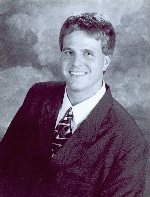Vegas nurse saves man’s life on plane
Las Vegas registered nurse Jahn Herrick could see that the passenger sitting near him Monday on an American Airlines flight from Las Vegas to Dallas was sweating profusely.
He also saw the man's wife shaking him.
"That's when I realized the man was unconscious," Herrick said late Monday from Alabama, where the Review-Journal contacted him as he visited an ill friend in Montgomery.
What happened during the flight to Dallas was described by American Airlines spokesman Ed Martelle "as a nurse stepping forward to help stabilize someone."
That's a bureaucratic way of saying the 36-year-old Herrick saved a man's life.
"I stepped forward, identified myself as a nurse, and asked the woman if she wanted any help, and she nodded yes," Herrick recalled. "She was very, very anxious."
The flight, which left shortly after 8 a.m., was less than two hours old when the plane became an emergency room.
Quickly, Herrick laid the man, who was sitting near the back of the plane, across the seats. His feet stretched into the aisle.
Flight attendants who were nearby saw what was going on and brought emergency equipment forward even as they called over the loudspeakers for any other medical personnel aboard to come to the back of the plane.
"At first, I detected a pulse," said Herrick, who started a saline IV on the man.
And then the pulse left.
Two doctors were also aboard the plane, but seeing that the critical care nurse seemed to have the situation under control, they let him continue his care, Herrick said.
He did chest compression CPR but it didn't seem to be making a difference.
Then came an injection of epinephrine, a drug used as a stimulant in cardiac arrest, to increase the heart rate.
That was followed by one shock to the heart delivered by an automated external defibrillator.
"The man started breathing again and came to," Herrick said.
Herrick and the doctors aboard the plane told the pilots that the flight did not have to be diverted. The passenger was stabilized and could land in Dallas safely.
Martelle noted that the passenger was met by paramedics from Dallas-Fort Worth airport who took him to a local hospital. Because of federal privacy laws, airport personnel could not divulge the name of the patient or his condition.
Just last Saturday, Herrick had attended a course on advanced cardiac care to keep his critical care skills up to par.
A big part of the training was the use of the automated external defibrillator.
"You just never know when you're going to use what you learn how things are going."
Herrick, who is looking for a job in an operating room setting, said nurses aren't always complimented for life-saving work. He said that back in December he was terminated from Southern Hills Hospital and Medical Center after stopping what he described as a near fatal nose bleed in a patient.
"A supervisor said I was supposed to ask an emergency room doctor first about doing the type of nasal packing I did, but I didn't have the time," he said. "I didn't want the patient to die. Many staff members said I did the right thing."
Stacy Acquista, marketing and communications director for the hospital, issued this statement, "Mr. Herrick is no longer employed at Southern Hills Hospital. The reason for his separation from employment is being investigated by the State Board of Nursing."
Herrick said, "I'm not ashamed of what I did at Southern Hills. I became a nurse to care for people, and I did so in a life-threatening situation. Whether I'm in a hospital or on a plane, that's what I'll do."
Contact reporter Paul Harasim at pharasim@reviewjournal.com or 702-387-2908.






















